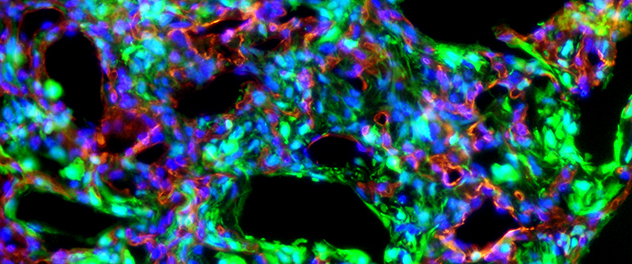
Lung tissue exhibiting profound cellular remodeling and fibrosis
Discovering Novel Regulators of Myofibroblast Biology
In this discovery-oriented project, the Tissue Repair and Mechanobiology Laboratory is using screening approaches, including RNA interference, RNA sequencing, assay for transposase-accessible chromatin sequencing, and small molecule libraries to identify novel gene and molecular regulators of myofibroblast function. Performing high-content image analysis helps the research team assess functional outcomes, including fibroblast cytoskeletal remodeling and matrix synthesis.
A cell that combines the matrix synthetic capacity of fibroblasts with the contractile properties of smooth muscle myofibroblasts plays an essential role in lung development. But it also contributes to pathological scarring of the lung in diseases such as pulmonary fibrosis.
There are no available therapies that successfully arrest or reverse fibrosis. This represents a significant unmet clinical need. Pathways known to be important in myofibroblast biology, such as transforming growth factor beta and Rho kinase, are challenging to target because of their important pleiotropic contributions to homeostasis and health. Thus, new targets to selectively regulate myofibroblast biology are needed.
The long-term goal of this project is to develop a systematic understanding of myofibroblast biology and identify novel targets by which the functions of this cell type can be therapeutically modified. Dr. Tschumperlin and colleagues hope to find new approaches for arresting or reversing progressive fibrosis.